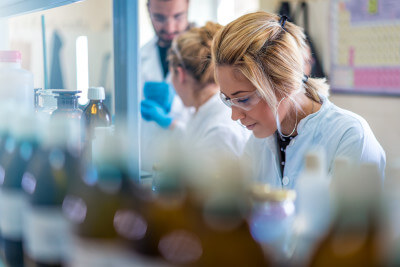Infectious Diseases
The COVID 19 pandemic has highlighted the importance of emerging infectious diseases. The epidemic or even pandemic spread of previously unknown viruses is not a new phenomenon, though, as demonstrated by infectious diseases such as influenza, AIDS, Ebola fever, and the Middle East Respiratory Syndrome (MERS) caused by SARS-CoV-2 related coronaviruses.
Also of rapidly increasing importance in infection research is the global rise of antibiotic resistance. Dubbed the "silent pandemic," antibiotic multidrug resistance resulting from overuse of antibiotics is now ubiquitous, causing conventional antibiotics to increasingly lose their effectiveness. The treatment of chronic bacterial infectious diseases such as tuberculosis is as much at risk from the lack of effective antibiotics as hospital-acquired infections with bacterial pathogens, most prominently methicillin-resistant Staphylococcus aureus strains and beta-lactamase-producing enterobacteria. The latter pose a particular threat to immunocompromised patients, whose numbers are steadily increasing in our ageing society.
Also of global importance are diseases caused by parasites, such as malaria, and neglected tropical diseases, which pose enormous health risks to hundreds of millions of people. In the fight against this multitude of viral, bacterial and parasitic infectious agents, scientists at the German Center for Infection Research (DZIF) are involved in screening new active compounds and developing diagnostic, preventive and therapeutic procedures.
Cancer

There are approximately 1.4 million cancer patients in Germany – and the number is rising.
Cardiovascular Diseases

Cardiovascular diseases continue to increase and are still the number one cause of death in Germany.
Child and Adolescent Health

During childhood and adolescence, the decisive course is set for health throughout life.
Diabetes

It is estimated that up to 12 million people in Germany could suffer from diabetes by 2040.
Lung Diseases

Every 4 minutes, a person dies in Germany as a result of lung and respiratory disease.
Mental disorders

Almost one in three people experience a mental illness in the course of a year.
Neurodegenerative Diseases

So far, there is no cure for neurodegenerative diseases.








